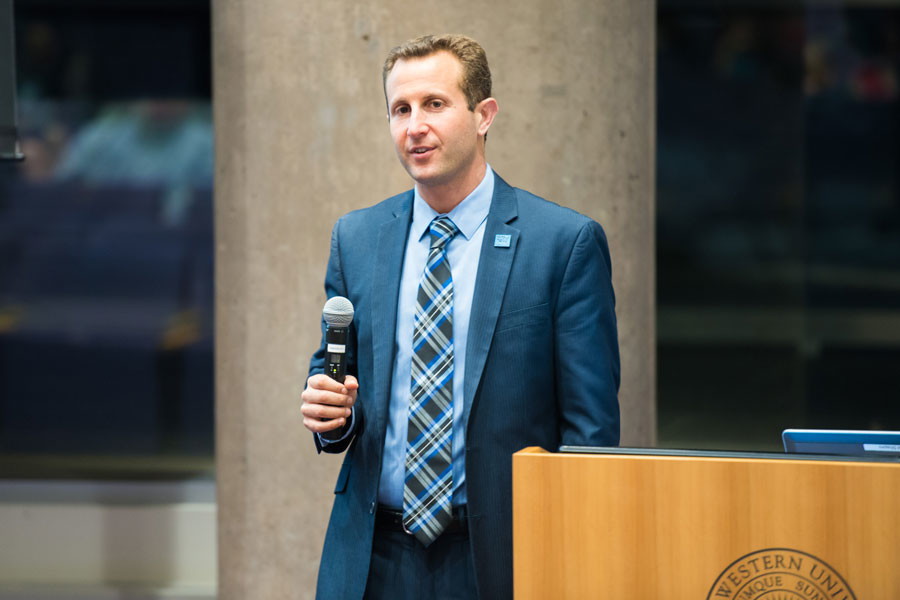Real Food at NU recognized by Humane Society with certificate
Daniel Tian/Daily Senior Staffer
Humane Society representative Paul Shapiro gives the keynote speech at a gala recognizing Real Food at NU’s efforts to make NU dining halls healthier and more sustainable. Shapiro discussed how a plant-based diet can benefit personal health and slow climate change.
October 21, 2015
The Humane Society of the United States presented Northwestern with two certificates of recognition at a ceremony Wednesday evening for its efforts to create healthier and more sustainable dining halls.
Paul Shapiro, vice president of Farm Animal Protection for the Humane Society, gave the keynote speech at the Segal Visitors Center and presented the certificates, one to University President Morton Schapiro — who did not attend the gala — and Real Food at NU, and one to Sodexo, NU’s main food provider.
The event was organized by members of Real Food at NU, the Humane Society and Sodexo. Sodexo’s branch at NU is in charge of NU Dining, catering for campus events, food at NU Athletics events and dining in Norris University Center, said Rachel Tilghman, Sodexo’s director of communications and engagement at NU.
Shapiro spoke about climate change and the extreme drought that threatens much of the nation. Additionally, he explained how reducing meat consumption and embracing plant-based diets not only saves water but also supports humane treatment of farm animals.
“It’s not that our country is becoming a vegetarian nation, but a large number of Americans are just eating less meat,” Shapiro said. “Reducing meat consumption even just one day a week could make some extremely impactful differences.”
Shapiro also explained the benefits of Meatless Monday, a government initiative in which school cafeterias and individuals choose to forgo meat consumption every Monday. Meat consumption has steadily declined since the beginning of the decade, perhaps in part due to the Meatless Monday campaign, he said.
“The trend is certainly clear in our country,” Shapiro said. “In the future, we’ll be eating less meat and more plants. We still have a long way to go, but leaders like Northwestern have been making the world a better place one bite at a time.”
Real Food at NU is the NU chapter of the national organization Real Food Challenge. Medill senior Miranda Cawley, Real Food at NU’s co-president, said “real food” meets qualifications and standards that make it better for both the environment and the people who consume it.
“I’m really interested in this because it’s the intersection of social and environmental justice — two things that are really important to me,” Cawley said.
Cawley said she brought the Real Food Challenge to NU during Spring Quarter 2014. In June, Schapiro signed a campus commitment pledging 20 percent of dining hall food will meet “real food” criteria by 2020, officially recognizing and supporting Real Food at NU’s goals.
The Humane Society also collaborated with NU Dining on Monday and Tuesday to offer plant-based cooking classes in the Hinman dining hall for students, faculty and other NU and Evanston community members.
“The classes were an eye-opening experience, and the response was great,” said Chris Studtmann, NU Dining’s district executive chef. “We all had lunch together afterward; everyone had a great time, and bringing these new flavors and ideas together was so exciting.”
Studtmann worked with Ken Botts, the Humane Society’s food policy manager, to organize the training sessions. Studtmann said he expects more changes and more awards at NU in the coming years.
Email: [email protected]
Twitter: @thecydneyhayes


